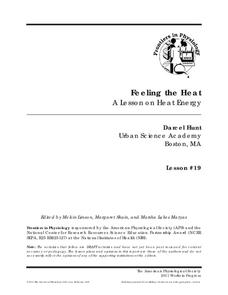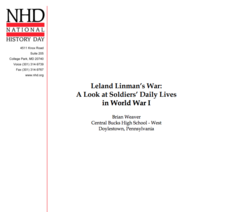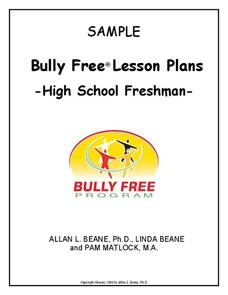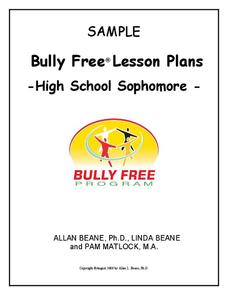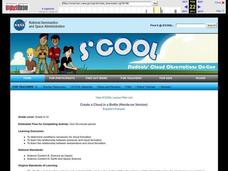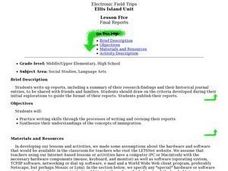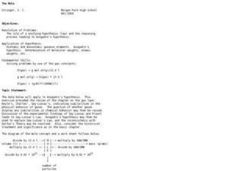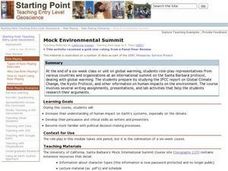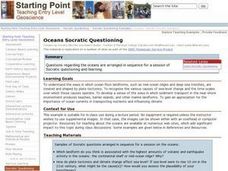Novelinks
Tuck Everlasting: Herber Readiness
Begin your unit on Natalie Babbitt's Tuck Everlasting with a pre-reading activity about the novel's themes. As class members ponder five questions that reflect the book's themes, they talk about their opinions in...
American Physiological Society
Feeling the Heat
How do the changing seasons affect the homes where we live? This question is at the forefront of engineering and design projects. Challenge your physical science class to step into the role of an architect to build a model home...
National History Day
Leland Linman’s War: A Look at Soldiers’ Daily Lives in World War I
Hunkering down in the trenches of World War I, Leland Linman decided to write a journal about his experiences. By reading Linman's entries in the fourth installment of an eight-part lesson series, scholars get a firsthand look at life in...
EngageNY
Final Performance Task: Presenting Graphic Novelettes
Let's get graphic. Serving as the final performance task of the unit, scholars complete their graphic novelettes and design covers based on their sketches. Finally, they present their hard work to classmates.
Bully Free Systems
Bully Free Lesson Plans—Ninth Grade
"Bullying and Prejudice" and "Do You Cyber Bully," two lessons from a complete Bully Free program, serve as samples of the approach used in a unit designed to bring awareness to and to combat bullying. Each lesson asks class...
Bully Free Systems
Bully Free Lesson Plans—10th Grade
Two lessons, "What Does Cyber Bullying Look Like?" and "Factors Influencing My Reporting the Bullying of Others," serve as examples of the 12 included in a Bully Free curriculum. Each plan includes discussion questions, an activity,...
Bully Free Systems
Bully Free Lesson Plans—11th Grade
It takes courage to stand up to bullies. Two sample lessons from a complete Bully Free curriculum, "Courageous and Brave Bystanders" and "Assertiveness Skills for Bullied Students and Empowered Bystanders" provide participants with...
Bully Free Systems
Bully Free Lesson Plans—12th Grade
Two sample lessons from a curriculum unit on bullying provide high school seniors with an opportunity to assess their online and cell phone behavior and to consider how they can offer support to bullied students. Each plan includes an...
Curated OER
Geologic History of A Large Igneous Province
Students explore the significance and geologic history of the Kerguelen Plateau Large Igneous Province, as revealed by Ocean Drilling Program (ODP) Legs 120 and 183. They examine all the source material and write an essay addressing the...
Curated OER
Writing about the climate
Learners research the contributing factors to the Earth's paleoclimate. They determine the relevant climate data and use it to construct a science argument. In the process, they access data, capture images of the data plots, and...
Curated OER
Being P-Waves and S-Waves
Young scholars participate in a demonstration in which they, themselves, represent seismic P-waves and S-waves.
Curated OER
Mass Balance Model
Students explore the concept of mass balance, flow rates, and equilibrium using a simple water bucket model. In this JAVA based online interactive modeling activity, they vary flow rate into the bucket, initial water level in the bucket,...
Curated OER
Human Demographics
Students explore factors that change human population growth in a biology simulation for seven countries including the United States, China, Egypt, Germany, Italy, India, and Mexico. Factors such as age at which women begin having...
Curated OER
Create a Cloud in a Bottle
Students investigate the conditions needed for cloud formation and explore how pressure and temperature effect cloud formation. In this atmospheric pressure lesson students complete a lab on cloud formation.
Curated OER
Presenting the Geologic Timescale
Students model the geologic timescale using distance as a metaphor for time. They write a summary of a major event or fossil organism. and station themselves and their summaries along a path within a gymnasium, and present their...
Curated OER
Wind Surge: Interactive On-line Mac and PC
Students examine the influence of the end wall. They find a basin size and wind speed such that a given wall height is overtopped. Then, increase the wall elevation until overtopping stops. Students explain the difference in results.
Curated OER
Final Reports
Students write reports, including a summary of their research findings and their historical journal entries, to be shared with friends and families, and publish their reports.
Curated OER
Would You Like to Become a Millionaire?
Students answer questions written by other teams about literature in an attempt to become "millionaires." In small groups they write a motivational introduction to their teams selected books, publish their questions as a HyperCard...
Curated OER
Advocacy Through Letter Writing
Students develop an advocacy plan to address a health-related need for a local, national or global health problem. Students write a detailed letter as part of their advocacy plan.
Curated OER
The Mole
Students explore the concent of using the mole to solve problems related to counts small particles of matter. Students work individually and in groups to complete conversions of substances from moles to matter.
Curated OER
Mock Environmental Summit
Students increase understanding of human impact on Earth's sytems and the climate. They develop persuasive and critical skills as writers and presenters. They become familiar with political decision making processes.
Curated OER
Oceans Socratic Questioning
Students participate in a whole class discussion of ocean-floor structures and plate tectonics. They respond to prompts in a structured sequence that lead them to conclusions about the role of plate tectonics in the creation of sea-floor...
Curated OER
Annotated, Detailed Example of Socratic Questioning
Students identify and define the main components of the hydrosphere and the ways in which they interact with one another. They explore how changes in Earth's surface materials affect components of the hydrosphere and evaluate the effect...
Curated OER
Time and Earth History Socratic Questions
Students develop a sense of geologic ("deep") time and the ways in which Earth scientists construct the geologic time scale. They study he major events that shaped Earth, including the origin and evolution of its lithosphere, atmosphere,...
Other popular searches
- Peer Editing Checklist
- Peer Editing 6 Traits
- Expository Writing Peer Edit
- Peer Editing Worksheet
- Peer Editing Protocol
- Peer Editing Template
- Peer Editing Narratives
- Student Peer Editing
- Peer Review Form
- Peer Editing Guide
- Writing Peer Editing
- Peer Review Essay

